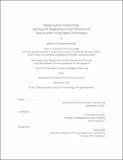Mobile Carbon Footprinting: Sensing and Shaping the Carbon Emissions of Daily Activities Using Digital Technologies
Author(s)
Brazier, Johnna Cressica
DownloadThesis PDF (9.597Mb)
Advisor
Zegras, P. Christopher
Terms of use
Metadata
Show full item recordAbstract
Lifestyle changes for reducing greenhouse gas emissions are becoming a necessary component of climate change mitigation. Data-driven digital tools for encouraging widespread participation in bottom-up emissions reduction and climate action do not yet exist, however, and emissions remain illegible in the public’s daily information context and built environment. In this dissertation, I examine whether digital technologies can make personalized emissions information more accessible and actionable in everyday life, by developing and evaluating a digital system for footprint feedback in three phases: an exploratory study, a short-term feedback intervention, and a quasi-experimental assessment of long-term participation in activities that reduce emissions. In focus groups and interviews, I use the exploratory study to understand how members of the public incorporate multi-dimensional, daily activity-oriented footprint information into evaluating their activity choices. I then incorporate these observations into the smartphone-based digital feedback tool, named Mobile Carbon Footprinting, which uses daily activity diaries to track and compare emissions across an interrelated set of everyday activities: travel, time at home and away from home, food, and other expenditures.
The results of the experimental intervention suggest that the digital feedback system might support short-term efforts to reduce emissions for a limited set of self-reported activities, but automatically recorded activities remain unchanged. Attention to the interactive footprint feedback was likely a key factor linked to emissions reductions. In line with previous studies, the information-based intervention increased participants’ awareness of the emissions consequences of daily activities. In the long term, however, increases in awareness might not improve, and might even reduce, motivation to participate in personal emissions reductions. In light of the experiment findings, I discuss the role of emissions feedback systems in directing attention to, motivating, and supporting learning and communication about lifestyle changes aimed at reducing emissions, as well as the technical and organizational challenges that widespread deployment of personal footprint tracking might face. Recognizing these challenges, I propose that future iterations of continuous, multi-activity footprint feedback designs could support policies and programs for behavioral emissions mitigation and education at multiple scales.
Date issued
2021-09Department
Massachusetts Institute of Technology. Department of Urban Studies and PlanningPublisher
Massachusetts Institute of Technology